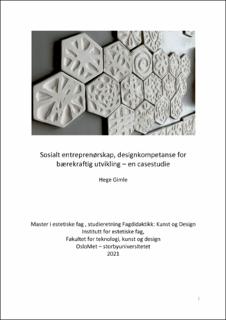Sosialt entreprenørskap, designkompetanse for bærekraftig utvikling - en casestudie
Master thesis
Published version
Permanent lenke
https://hdl.handle.net/11250/2771149Utgivelsesdato
2021Metadata
Vis full innførselSamlinger
Sammendrag
Denne masteroppgaven har tema designkompetanse for bærekraftig utvikling.
Avhandlingen har et fagdidaktisk formål rettet mot undervisning og opplæring av unge voksne i voksenopplæring og yrkesfaglig praksis i fagområder innenfor kunst design og håndverk.
Undersøkelsen som blir presentert i denne avhandlingen handler om hvordan en sosial entreprenørskapsbedrift kan gi kunnskap som kan være et bidrag til designkompetanse for en bærekraftig utvikling. Bedriften har sitt virksomhetsområde innenfor sosial verdiskapning gjennom arbeid med kunst, design, produksjon og salg av håndverksprodukter.
Undersøkelsen er en casestudie. Empiri er produsert gjennom to kvalitative intervju, observasjon og dokumentundersøkelser.
Designkompetanse for bærekraftig utvikling blir belyst gjennom tre temaer:
- Designkompetanse gjennom god utdanning
- Designkompetanse gjennom anstendig arbeid og økonomisk vekst
- Designkompetanse gjennom ansvarlig forbruk og produksjon.
De tre temaene drøftes i et teoretisk og utdanningspolitisk grunnlag gjennom teori om designkompetanse, design literacy, økoliteracy, sosialt entreprenørskap og utvalgte bærekraftsmål.
Sentrale teorier som drøftes i avhandlingen er narrativet Awareness through making og Participate in design processes som handler om førstehåndsopplevelser med materialer som en del av å utdanne en designkompetent allmennhet og viktigheten av personlige erfaringer med designprosesser hentet fra Eva Lutnæs sin forskning om hvordan utdannelse i designkompetanse - design literacy kan være en forutsetning for overgangen mot et mer bærekraftig samfunn. This master's thesis has the theme of design competence for sustainable development.
The dissertation has a didactic purpose aimed at teaching and training young adults in adult education and vocational practice in subject areas within art design and crafts.
The study presented in this dissertation is about how a social entrepreneurship company can provide knowledge that can be a contribution to design competence for sustainable development. The company has its business area within social value creation through work with art, design, production and sales of handicraft products.
The study is a case study. Empirical data is produced through two qualitative interviews, observation and document investigations.
Design competence for sustainable development is highlighted through three themes:
- Design competence through good education
- Design competence through decent work and economic growth
- Design competence through responsible consumption and production
The three topics are discussed in a theoretical and educational policy basis through theory of design competence, design literacy, eco literacy, social entrepreneurship and selected sustainability goals.
Central theories discussed in the dissertation are the narrative Awareness through making and Participate in design processes which is about first-hand experience with materials as part of educating a design-competent public and the importance of personal experiences with design processes taken from Eva Lutnæs´ research on how education in design competence/ design literacy can be a prerequisite for the transition to a more sustainable society.
